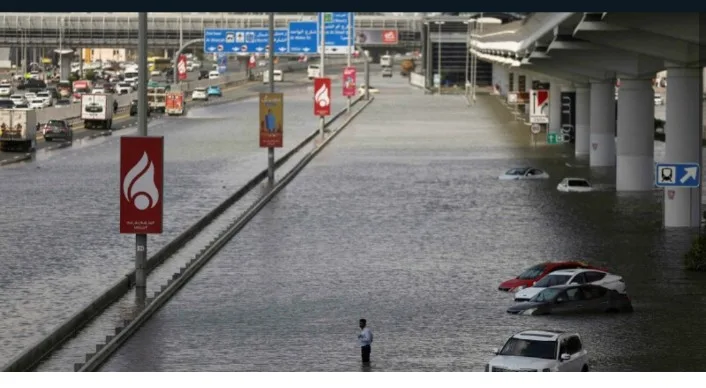The United Arab Emirates (UAE) was still grappling on Thursday with the aftermath of a record-breaking storm this week that brought much of the country to a standstill.
In Dubai, operations at the airport, a major travel hub, remain disrupted after Tuesday’s storm flooded the runway, resulting in flight diversions, delays and cancellations.
The airport said on Thursday morning it had resumed receiving inbound flights at Terminal 1, used by foreign carriers, but that flights continue to be delayed and disrupted.
Emirates, the single largest carrier at the airport, said it would resume checking-in passengers in Dubai at 9am (0500 GMT) on Thursday, delaying the restart from midnight by nine hours.
The airport struggled to get food to stranded passengers with nearby roads blocked by flood waters, and because of overcrowding limited access to those who had confirmed bookings.
The storm, which hit neighbouring Oman on Sunday, pounded the UAE on Tuesday, flooding roads and causing hours-long gridlock as rainwater inundated homes. One person was reported dead in the UAE and 20 in Oman.
Flooding trapped residents in traffic, offices and homes as the UAE recorded its heaviest rains in the 75 years that records have been kept, authorities said.
Authorities have also told government employees and students to stay home while waterlogged roads are cleared.
Climate experts say rising temperatures caused by human-led climate change are leading to more extreme weather events around the world, such as the storm that struck the UAE and Oman.
“It’s likely that the storm was kind of supercharged by climate change because there’s just more moisture available in the air for any storm system to then precipitate out,” said Colleen Colja, a climate scientist at Imperial College London.
Researchers anticipate that climate change will lead to heightened temperatures, increased humidity and a greater risk of flooding in parts of the Gulf region.
The problem can be worsened in countries like the UAE where there is a lack of drainage infrastructure to cope with heavy rains.
A UAE government agency that oversees cloud seeding — a process of manipulating clouds to increase rainfall — denied that any such operations took place before the storm.
The UAE state news agency late on Wednesday carried a statement from President Sheikh Mohammed bin Zayed Al Nahyan saying he had ordered authorities to assess the damage and provide support to families impacted by the storm.
By Reuters






